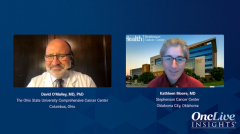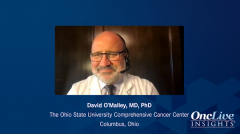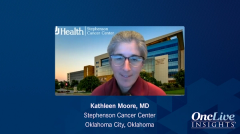
Expert Commentary on the Patient’s Treatment Plan
Expert oncologists discuss the patient’s first-line treatment plan and comment on how they would have approached her care.
Episodes in this series

Transcript:
Kathleen Moore, MD: With that information and the CT scan as described, Dr O’Malley, how would you have approached her therapy in terms of diagnostic testing? Is there anything else you wanted to know? Do you agree with the treatment that was rendered? How would you have treated her?
David O’Malley, MD: Thank you, Katie. Katie and I talk about this stuff all the time, so to be on with such an interesting case…. Stage IVA is not a very common stage, growing into the bladder, so a really challenging scenario here. I can’t argue with the plan, they gave 6 cycles, except when it comes down to, “I’m just going to follow the patient at 3 months.” I’d probably be more aggressive on this otherwise healthy 67-year-old. I would talk to her about surgery. She probably would require an anterior [exenteration]-like procedure, but you may be able to preserve the bladder and just take off a portion of the posterior. That would require reimplanting the uterers, most likely, but I think that would be something I’d definitely consider.
The first thing I would’ve done seeing this patient, I would’ve called up my research staff and said, “I have this stage IV patient. What clinical trials are available?” If we knew she’s dMMR [mismatch repair deficient], we have GOG-3064, which is the C93 or KEYNOTE-C93 trial, which is one of the most exciting trials I think we have launched in gynecologic cancers. It is comparing pembrolizumab vs chemotherapy, carboplatin, paclitaxel, and then upon progression after carboplatin-paclitaxel, they can cross over to pembrolizumab. This would have been a fantastic option for the patient.
Maybe she wasn’t a surgical candidate. Maybe she didn’t want a big surgery that would have a fair amount of risk. It’d be very reasonable not to pursue. But at this point, if the patient had persistent disease, I would’ve then gone to dostarlimab or pembrolizumab in this scenario, if she had persistent disease, even potentially before surgery, trying to get that disease to shrink more. I probably would have sent a TP53 test on this, but because it’s behaving aggressively, I know I’m going to use the chemotherapy or some sort of immune therapy. The other thing is we still have the NRG-GY018 trial open. GY018 is carboplatin-paclitaxel plus or minus pembrolizumab. We’ve already closed DUO-E and RUBY part 1 and 2, but those would’ve been great treatment options for this patient. Chemotherapy plus/minus IL [interleukin] therapy, plus/minus PARP inhibitors. GY018 is still enrolling, but only for proficient patients.
Would I have tested anything else? What I would do on a stage IV patient, I don’t mess around. I send next-generation sequencing, I get that right away. I’ve even become proactive, especially in the grade 3, checking HER2/neu, seeing if they are potentially eligible for anti-HER2 therapy in that. Those are the 2 tests I would look for. I agree with the chemotherapy, and at this point, I would assess her for surgery, but continuing therapy. If she had persistent disease, she would meet the criteria of previous systemic chemotherapy and would be eligible for pembrolizumab or dostarlimab.
Kathleen Moore, MD: She received carboplatin-paclitaxel, and you said you agreed with that. Is there any other regimen that you might use, or is that really the standard of care in this setting?
David O’Malley, MD: I think it’s the standard of care. Now, if a patient would not agree to chemotherapy, if it’s grade 1, I would talk to them about hormonal therapy or antihormonal therapy with progesterone therapy or an aromatase inhibitor. But in this grade 3 patient, particularly if she’s TP53 mutated, I would stick with the chemotherapy or immune therapy, well before I went to hormonal or antihormonal therapy.
Kathleen Moore, MD: I agree with that. I think, for the audience, when we are faced with a patient with advanced—I’ll talk specifically about advanced, and we can talk about recurrent in a moment—but in the advanced stage, we really have a dearth of information, unfortunately, on the importance of surgery. The information we have is largely from retrospective studies. I think a lot of us believe that, if possible and in appropriately selected patients, surgery is important. It probably does impact progression-free survival. It’d be hard to argue how it couldn’t. Does it impact overall survival? We just don’t have those data. But certainly, getting the primary tumor out and debulking before you embark on chemotherapy is, for a lot of us, the preferred modality. If you get a great response after 3 to 6 cycles and everything that made her stage IV has melted away, we have robotic capabilities now, laparoscopic capabilities to go and at least remove the primary, which to me makes sense.
Again, we don’t have data, so we can’t say, “must do,” but it’s something we consider to optimize outcomes. You have to take into account age, not just age though, [but also] frailty and comorbidities. A lot of times our patients present with a lot of medical issues, this patient does not. Is their diabetes under good control? Do they have terrible hypertension? There are someother obesity-related comorbidities that can limit how aggressive you are surgically, but that’s not always the case. This is what goes into how we consider this frontline approach.
David O’Malley, MD: You know what else? We didn’t mention radiation for stage IVA disease, particularly if they’re symptomatic, we may consider radiation. It never has been shown to impact survival, but has been shown to impact locoregional control. So in this particular patient, that would be part of the conversation, particularly if they weren’t a surgical candidate, to try to control their local disease, particularly if they were symptomatic, meaning bleeding.
Kathleen Moore, MD: I think that, as much as we do, and you and I both do clinical trials, and I believe in clinical trials, there’s no but to that, there are a lot of scenarios in medicine where we have not answered the question with a clinical trial. So you have to individualize to the patient sitting in front of you based on best knowledge and best practices. I think that endometrial cancer is becoming one of those diseases where you have to apply the knowledge as it emerges. Finally we’re doing studies where we’re getting more data, but then you just have to, I think, apply the art of medicine as well.
Just to reiterate what you said, because it really has changed. I think we have a lot of people listening who maybe don’t see a lot of endometrial cancer, but pushing the pathologist to give you the test that you need at the beginning is really important. You can send next-generation sequencing. If you’re sending certain assays that have immunohistochemistry [IHC], you canadd HER2 IHC. You may get the mutation or amplification from next-generation sequencing, but you won’t get the IHC. You can add it though, per request, or you can have your local pathologist do that. But anyone who’s serous or high-grade endometrioid with loss of TP53, like Dr O’Malley mentioned, those tumors need to be screened for HER2 by IHC, and you can send the next-generation sequencing as well. We have phenomenal agents now, thanks to our colleagues in breast cancer, that work even in those patients who are [HER2] low. [There are] early data in endometrial cancer that these are effective drugs. We will want to know that for later, but if you know someone has HER2 by traditional scoring, 2 plus FISH [fluorescence in situ hybridization] or 3 plus, there’s an NCCN [National Comprehensive Cancer Network] listing already for trastuzumab in this setting.
Now, this patient is mismatch repair deficient, so the likelihood that she has HER2 is probably pretty low. There’s not a lot of overlap between those, but there is a little, so I agree with sending that testing, 100%. Making sure you have mismatch repair. I always ask for estrogen and progesterone testing, even though in a grade 3 I may not use it, but I still get it. I think the next-generation sequencing is important because you’ll find things, ARID1A, other mutations that may be actionable down the road. But her frontline therapy, as you said, is paclitaxel-carboplatin. I think the one difference here would be if she was HER2 by IHC, you would have added trastuzumab to this mix.
Transcript edited for clarity.






































